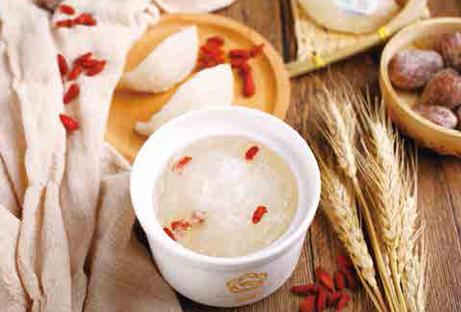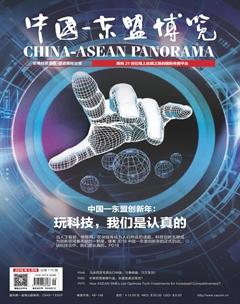Export of Malaysian Edible Bird’s Nests to China: Everything Almost Ready
Written by Li Min and Liu Yang / Translated by Jiang Yaqian


The last day of March was a busy day for Ong Ah Biau, Manager of CROPCARE BIOTECH (CCB) of Malaysia. Early in the morning, she took the edible birds nest products of her company to the Malaysia (Nanning) Edible Birds Nest Festival 2018 for exhibition and spot sales. In the afternoon, she attended the Malaysia (Nanning) Edible Birds Nest Festival 2018: Edible Birds Nest Industry Promotion Forum (hereinafter referred to as “the Edible Birds Nest Forum”).
At the Forum, China-ASEAN Panorama had an interview with Ong Ah Biau, who was consulting about the export of Malaysian raw edible birds nests to China. She said that the edible birds nest products of her company had gained much attention from consumers. However, for her, who works for a Malaysian company investing in the production and processing of raw edible birds nests in China-Malaysia Qinzhou Industrial Park (CMQIP), what matters most is when Malaysian raw edible birds nests can be permitted to be exported to China. This is also the main concern of many Chinese and Malaysian enterprises at the Malaysia (Nanning) Edible Birds Nest Festival 2018.
China-ASEAN Panorama was informed at the Edible Birds Nest Forum that work on the entry of Malaysian raw edible birds nests into China has entered the final stage. At the moment, almost everything is ready for their export to China.
The way of Malaysian edible birds nests into China
As a traditional food with high nutritional value, edible birds nest has enjoyed great popularity among Chinese consumers. Particularly, as recent years have seen a gradual improvement in peoples living standards, China has a growing consumer demand for edible birds nest products. At present, China has emerged as the worlds largest market for edible birds nests, but its edible birds nest products are mainly imported from Indonesia, Malaysia and other ASEAN countries.
And yet for Malaysia, the worlds second largest producer of edible birds nests, the export of its edible birds nest products to China is not always smooth. In 2011, severely excess nitrite was detected in “blood birds nests”, which were regarded as a nutritious treasure, causing a huge panic among consumers. This incident also led to a shock to the sales of imported edible birds nest products in China.
“After July 2011, Chinas General Administration of Quality Supervision, Inspection and Quarantine (AQSIQ) tightened the inspection, quarantine of and supervision over imported edible birds nest products, and once suspended the import of all edible birds nest products. It also implemented a market access management system, under which only those edible birds nest products with granted access could enter Chinese market,” said Qin Wenchang, Deputy Director of Department of Food Safety Supervision of Guangxi Entry-Exit Inspection and Quarantine Bureau at the Edible Birds Nest Forum. Until December 25, 2013, thanks to the joint efforts of relevant departments of China and Malaysia, AQSIQ issued Announcement on the Inspection and Quarantine Requirements of Edible Birds Nests to be Exported from Malaysia to China, marking the resumption of export of Malaysian cleaned edible birds nests to China.
At present, China has granted registration to the cleaned edible birds nest products of 19 Malaysian enterprises, which means these products could be sold in China; and that figure will increase to 31 in 2018, according to Quaza Nizamuddin, Director-General of Department of Veterinary Services of Ministry of Agriculture and Agro-based Industry of Malaysia. This is undoubtedly good news for those Malaysian enterprises. Yet for Malaysian birds nest farmers in the downstream part of the industrial chain, there is something else in their expectation.
What they are expecting is the large-scale export of raw edible birds nests to China. Among the tens of thousands of kilograms of raw edible birds nests exported from Malaysia each year, only a small portion are destined to China, while more than half of the rest are sold to other countries and regions. However, the demand for raw edible birds nests in other markets is far less than that of China, making it difficult for farmers to sell their products. As a result, relevant departments in Malaysia have begun to pay attention to the embarrassing situation of these farmers. On the other hand, compared to the edible birds nest products with intensive processing, the raw edible birds nests enjoy a price advantage, and they can also create employment opportunities and avoid the loss of foreign exchanges for importing countries. Given all these factors, China stays open to raw edible birds nests.
Against such backdrop, work on exporting raw edible birds nests to China has been steadily pushed forward, and substantial progress has been made.
Everything almost ready for the export of Malaysian edible birds nests to China
“Based on the resumption of export of Malaysias cleaned edible birds nests, relevant departments of China and Malaysia have launched the work on the entry of Malaysian raw edible birds nests to China,” said Qin Wenchang. “In November 2016, AQSIQ and the Ministry of Agriculture and Agro-based Industry of Malaysia signed the Protocol on Inspection, Quarantine and Veterinary Hygiene Requirements for the Exportation of Raw-unclean Edible Birds Nest from Malaysia to China (hereinafter referred to as “the Protocol”), which marked a significant breakthrough in this work.”
According to the Protocol and relevant laws of China, China implements a series of administrative measures on imported raw edible birds nest products, including quarantine admittance, quarantine approval, entry from designated ports, filing for record of overseas primary production and processing enterprises, filing for record of domestic production and processing enterprises, and inspection of arrivals, sampling inspection and quarantine. This means that China needs to designate the first domestic port for importing raw edible birds nests, and both Chinese and Malaysian enterprises engaged in the import, export and processing of raw edible birds nests must be put on record.
On March 5, 2018, the declaration of Chinas first port (inspection field) for importing raw edible birds nests was basically completed. Located in CMQIP, the designated port has passed the evaluations and assessments of relevant departments. Therefore, it can be used as the site for inspection, quarantine as well as production and processing of imported raw edible birds nests, providing a hardware guarantee for their export to China.
On March 12, 2018, Bureau of Import and Export Food Safety of AQSIQ and Ministry of Agriculture and Agro-based Industry of Malaysia carried out consultation on specific technical issues, such as epidemic prevention and treatment of raw edible birds nests to China, and reached agreement. “After receiving and approving the list of primary processing enterprises, certificate samples of raw edible birds nests, and handwritings of veterinary officers provided by Malaysian side, China can issue an announcement to allow Malaysian raw edible birds nests to be exported to China and processed by the designated Chinese enterprises,” said Qin Wenchang. “Right now, the two sides are stepping up the final work on the entry of Malaysian raw edible birds nests to China, and their export will materialize in the near future.”
“In promoting the export of Malaysian raw edible birds nests to China, there are two major difficulties: Malaysias preprocessing center for raw edible birds nests fails to put into use, and there is uncertainty of the source of swiftlets nests for the products,” said Liang Zhi, General Manager of Jingu Investment Co., in CMQIP in an interview with China-ASEAN Panorama. “The relevant departments and units of China and Malaysia will continue consultation, carry out scientific research on the features of edible birds nest products, and solve problems through scientific and advanced technologies as well as optimization programs.”
As an important platform for investment cooperation between China and Malaysia, CMQIP has taken the lead in boosting the export of Malaysian raw edible birds nests to China.
Producing reassuring edible birds nests in CMQIP
It is naturally that what consumers concern most is the quality of edible birds nests. However, the wide varieties of edible birds nest products and brands in the market make it hard for consumers to identify their authenticity. Imagine that simply by scanning the QR code on the products, consumers can know the source of raw materials and customs clearance information, is it a good way for consumers to buy reassuring and quality edible birds nest products?
In fact, this is by no means an imagination. “China Certification & Inspection Co., Ltd. (CCIC) can provide information tracing service for Malaysian edible birds nests, ranging from the source of swiftlets nests, collection, purchase, storage, export and import, processing, packaging and consumption of the products. With technical means of inspection and testing certification such as field verification, factory inspection and system certification, it can conduct collection, management and transmission of quality information, thus to realize a third-party supervision that covers the whole process and entire chain over the quality of edible birds nests. In this way, it will offer integrated and reliable quality tracing service to government regulators, manufacturers, processors, traders and end consumers,” said Zhang Long, Business Director of CCIC Traceability Technology Services Co., Ltd. In the future, the processing and production enterprises in the CMQIP are expected to achieve full traceability of imported edible birds nests through this technology.
Gao Pu, Executive Deputy Director-General of CMQIP Administrative Committee, said that a combined way of “registration and record at production sites, full-enclosed transport, park inspection and supervision, and tracing at processing sites” has been explored and adopted, so as to speed up the construction and operation of the projects in a specially-built processing and trade base for edible birds nests in CMQIP. The base will be the core platform for CMQIP to develop edible birds nest industry.
It is reported that the CMQIP processing and trade base for edible birds nests (Phase I) was officially put into operation in November 2017. It is the first clustered platform covering the entire industrial chain for the development of edible birds nest industry. At present, more than 10 Chinese and Malaysian enterprises specializing in edible birds nests have settled in the base, with a total of over 50 edible birds nest projects. In the meantime, construction of Phase II has been started, and is planned to be completed by the end of 2018. By then, the annual processing capacity for raw edible birds nests in the base will be above 120 metric tons, with an annual value of about RMB 4 billion yuan.
“The opening of the processing and trade base for edible birds nests will not only help reduce production costs for enterprises, but also bring the biggest benefits for Chinese consumers. This will be a win-win result,” said Liang Zhi, adding that it is also an opportunity for Malaysian enterprises in CMQIP to further open up Chinese market. He said that settling in CMQIP, Malaysian enterprises can carry out processing of raw and cleaned edible birds nests in a convenient, legal and open manner in China. They can also realize seamless integration of production, processing, deep processing and sales of their products. Meanwhile, as the production site is an important factor in determining the quality of primary agricultural products and food, Malaysian enterprises can build their edible birds nests into high-end products, of which the source of raw materials can be traced back, and physical products be seen in CMQIP.
Like Ong Ah Biau, Cui Ziyang also works in a company in CMQIP. He said that it was the governmental support for the import of raw edible birds nests here that prompted the settlement of his company from Foshan, Guangdong to CMQIP. And he is very confident that his company will usher in a better development in CMQIP in the future.

